Juan Palacio Moreno came into the world fighting for his life, and he’s been a fighter ever since.
In May 1995, he was born one month premature in Bello, Colombia. Unequipped to provide him with the necessary medical care, doctors told his parents the only thing they could do was pray.
Palacio Moreno survived, but it wouldn’t be the last time his life was in danger.
When he was 4, he answered the phone to a man he didn’t recognize. The man asked for Palacio Moreno’s father, a journalist who covered the ongoing war between the government and leftist guerrilla groups. His father wasn’t home.
“Tell your dad he’s not going to eat natilla this Christmas,” the voice said. Naive to the threat on his father’s life, Palacio Moreno couldn’t understand why his father wouldn’t be eating the traditional holiday dessert. He told his mother, Adriana Mertens Alzate, but she provided no explanation.
Today, Palacio Moreno, a Lehigh graduate student, is a U.S. citizen with political asylum working toward a career in immigration law. His motivation stems from an invisible but tumultuous past.
The guerrilla wars began in Colombia in 1969. Jose Palacio — Palacio Moreno’s father — was passionate about the work he did as a journalist. He wrote despite the ever-present danger of publishing the right article about the wrong people — an offense potentially punishable by execution.
As his work gained popularity, even winning a Colombian Pulitzer, Jose Palacio began receiving death threats, which quickly spilled over to his family. Though the two divorced shortly after Palacio Moreno’s birth, threats were made against Mertens Alzate, and eventually the son they shared. Mertens Alzate decided she and Palacio Moreno would leave Colombia to live with her sister in Philadelphia. Jose Palacio deemed his work too important to leave with them.
Lacking the resources to apply directly for political asylum, Mertens Alzate applied for a tourist visa for herself and her son. It would take an entire year for the paperwork to go through.
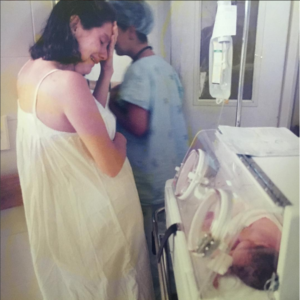
Adriana Mertens Alzate cries as her newborn son, Juan Palacio Moreno, lies in a hospital incubator in Bello, Colombia. Palacio Moreno was born one month premature in 1995 and doctors didn’t expect him to survive.
(Courtesy of Juan Palacio Moreno)
Despite the country’s state of unrest, Palacio Moreno was never aware of the violence. The only death he experienced was his parrot, who attempted to fly off the roof unaware of its clipped wings. His home filled with his grandmother’s hoarded clutter was the extent of chaos.
He remembers spending days at El Colombiano’s printing press where his father worked, and at the coop where his father trained racing pigeons.
He remembers holding aspirations of priesthood. During mass one Sunday when he was 3 years old, he ran up to the altar mid-prayer, his mother horrified. The priest hoisted him in the air in front of the congregation. The two would share this Sunday tradition for the remainder of Palacio Moreno’s time in Colombia.
He remembers the times his grandfather would come home from the butchery he owned, and Palacio Moreno would run to the fridge, grab him a beer and set up an altar in front of the television. His grandfather watched Atlético Nacional, Colombia’s best soccer team. Palacio Moreno led a prayer.
Amidst the turmoil, his existence was carefree and innocent.
After a year of waiting in danger, the paperwork for the tourist visa finally went through. Palacio Moreno and his mother boarded a plane to the United States in November of 2000.
He thought they were going on vacation.
As the plane flew into John F. Kennedy Airport, Palacio Moreno got his first glimpse of the United States. He’d been on planes before, but nothing he’d ever seen compared to the twinkling lights of New York City coupled with the maze of congested highways.
But chased out of his home country by a threat he never knew existed, Palacio Moreno witnessed terror where he and his mother sought asylum.
“My earliest memory living in the U.S. was leaving kindergarten and seeing the twin towers fall,” he said. “So, I’ve always thought about that being my first American experience.”
After one year in America they were granted political asylum. He learned English quickly, only stumbling when it came to understanding the function of an apostrophe.
After two years in America, he realized the trip wasn’t just a visit. It was permanent.
The political asylum kept them safe while they waited for American citizenship but made it nearly impossible to return to Colombia.
It would be seven years in America before Palacio Moreno could visit. It was a different world by the time he returned the summer before eighth grade.
He surprised his grandfather at the butchery. He still remembered the path — down the street to the plaza and left onto the next street. In his best Spanish, he ordered a pound of filet mignon. It was about 30 seconds before his grandfather recognized him.
Family. Friends. Journalists from El Colombiano. Palacio Moreno felt overwhelmed by all the people who knew him, many of whom he didn’t recognize.
“In Colombia, everyone’s your cousin,” he said.
He was embarrassed when he spoke without his Colombian accent. His cousins called him “gringo.” Still, he loved visiting.
He was home.
To Palacio Moreno, life in Colombia was consistent, reliable. His life in America was anything but that.
He and his mother moved constantly. He would attend six schools before finally spending four years in the same place for high school. Changing schools so frequently made him good at making new friends, but it prevented him from maintaining a consistent friend group. Despite all of this, the hardest adjustment, he said, was the cold weather. His mother proudly watched her son adapt.
“I know it was difficult, but he never complained,” she said. “He knew we were here for something different, something better.”
Mertens Alzate’s transition wasn’t as simple. She found her first job in a factory but was ultimately laid off. She struggled to find work as a non-English speaking immigrant, taking day and night shifts working in restaurants, cleaning houses, washing toilets and driving buses. Money was always tight.
But whenever Mertens Alzate felt herself begin to crumble, her son helped her fight on.
When Palacio Moreno was in eighth grade, the family was living in the basement of a friend’s home. At an age when personal space was essential, he had none. Mertens Alzate would feel him shiver when she’d return from work at midnight, climb into the bed they shared and brush against him with her legs still cold from the walk home. He wouldn’t complain.
After years of walking everywhere, his mother attempted to get her licence. She failed the written test and then the parallel parking portion three times. Palacio Moreno helped her.
One day Mertens Alzate checked her bank account and found only $70. Palacio Moreno comforted her.
After years of food stamps and living in projects, public housing, apartments and basements, Mertens Alzate was able to maintain financial stability for herself and her son. Palacio Moreno was content either way, as long as he could go to the public library and read.
“My mom would joke that growing up, I was never much of a kid,” he said. “I think I was aware of not being well off, but I never cared that much.”
His mother’s advice to him was to study, though she never asked to see a report card.
She trusted her son would take care of himself, and he did.
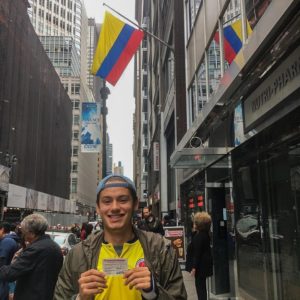
Juan Palacio Moreno, ’16, ’17G, stands outside the Colombian consulate in New York City on Oct. 2, 2016 after voting to pass a referendum to promote peace and end 52 years of war in Colombia. Palacio Moreno is a dual citizen of Colombia and the United States.
(Courtesy of Juan Palacio Moreno)
Today, Palacio Moreno is 21 and a citizen of both Colombia and the United States. He no longer has to fight for his life.
In 2016, he voted to pass a peace referendum to end the same guerrilla wars that forced him to leave Colombia. That referendum was signed into order by the Colombian congress in November.
He visits at least once every other year. Proud to show off his country, Palacio Moreno makes an effort to bring a friend every time he returns. Summer Sullivan, his close friend since high school, will accompany him during spring break this year.
“Just seeing how much he cares about where he comes from, how passionate he is, and why he wants to get into the work he’s doing, I want to experience it for myself and share that with him,” she said.
Inspired by his father, who still continues to defend the press in Colombia today, Palacio Moreno now fights for his country.
When he finishes his master’s in political science, he hopes to attend law school and fight for the rights of immigrants, refugees and asylum seekers.
“Teachers could’ve waved me off and said, ‘Oh he lives on Sixth and Walnut Street. I can’t teach him,’ but they always had hope,” he said. “And I think it’s really important to always have hope in other people.”
The teachers, friends and family who fought for him were essential to his success, and with President Donald Trump’s attempt at an immigration ban in January, Palacio Moreno considers his work fighting for immigrants more important than ever.
“I just want to pay it forward,” he said. “I think every person, if they’re of good character and hard-working abilities, deserves the same opportunities I had.”
Today, he fights for their lives.

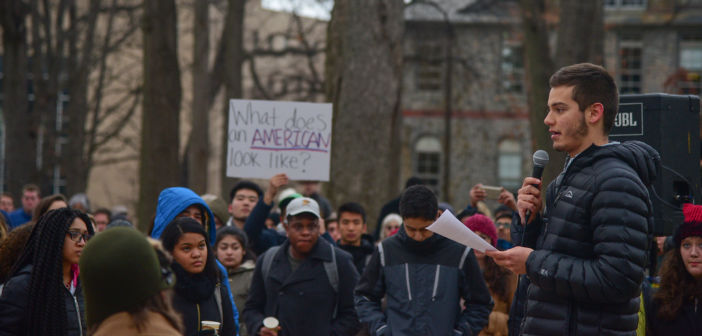

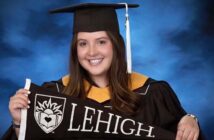
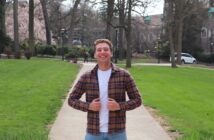
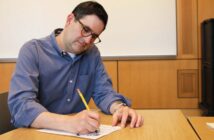
Comment policy
Comments posted to The Brown and White website are reviewed by a moderator before being approved. Incendiary speech or harassing language, including comments targeted at individuals, may be deemed unacceptable and not published. Spam and other soliciting will also be declined.
The Brown and White also reserves the right to not publish entirely anonymous comments.
1 Comment
Great job Juan. Memories from St. Paul’s.